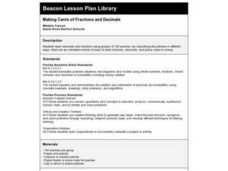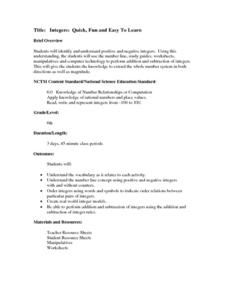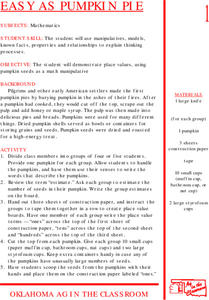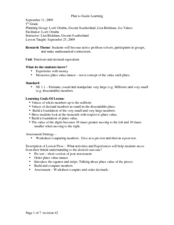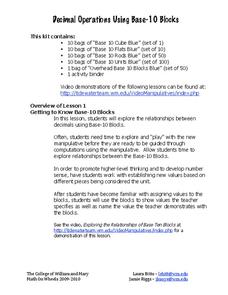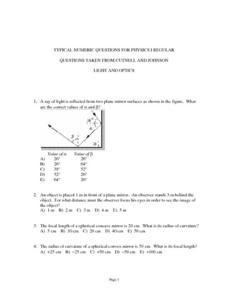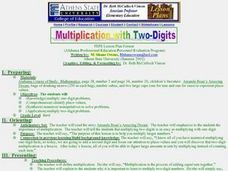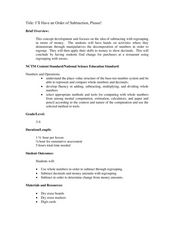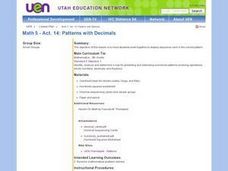Curated OER
Three-Digit Addition
Students work with hundreds place value, create and manipulate three-digit addition problems, and add three-digit numbers.
Curated OER
Making Cents of Fractions and Decimals
Students explore decimals and fractions using groups of 100 pennies. By classifying the pennies in different ways, there are an unlimited number of ways to learn fractions, decimals, and place value in money. This is a good, hands-on...
Curated OER
Put Your Hands on the Values-Math Manipulatives
Fifth graders visit Web sites on the World Wide Web for interactive practice in recognizing place value for numbers. They work in teams of two to practice identifying place values of whole number and decimals by creating place value cards.
Curated OER
Coin Motion
Students recognize coins and their values and count coin groups. They play a game where when music is turned on they skip, hop, jog and when it is turned off, they go to a spot in the room marked with the same coin or value as is in...
Curated OER
Tens and Ones
Learners view three problems involving adding or subtracting with ones and tens. Each problem is followed by an explanation and an answer as to how the problem should be done. Note: This resource contains incorrect grammar and could be...
Curated OER
Do You Value That Digit?
Sixth graders explore the term digit using large number and comma cards as they create numbers. In this digit value lesson, 6th graders identify the value of digits in large numbers and receive additional practice with the new terms to...
National Security Agency
Integers: Quick, Fun and Easy To Learn
A good complement to any integers unit contains a three-day lesson plan about positive and negative integers, adding and subtracting integers, and how to find the additive inverse. Additionally, it provides all necessary worksheets and...
BW Walch
Creating and Graphing Linear Equations in Two Variables
This detailed presentation starts with a review of using key components to graph a line. It then quickly moves into new territory of taking these important parts and teasing them out of a word problem. Special care is taken to discuss...
Curated OER
Comparing and Ordering Decimals - Complete Lesson Plan
Base ten blocks serve as visual representations of numbers that include decimals to the hundredths place. Children compare and order decimals in their math journal as they build the corresponding numbers with base ten blocks.
Curated OER
EASY AS PUMPKIN PIE
Students demonstrate place values using pumpkin seeds as a math manipulative. They use manipulatives, models, known facts, properties and relationships to explain thinking processes. They estimate the number of seeds in their pumpkin.
Curated OER
Fractions and Decimal Equivalents: Fifth Grade
Sometimes a skeleton is all you get. This lesson outline provides teachers with a basic lesson flow. Pupils will pre-test, order place value names, use manipulatives, and build and compare numbers. How this is to be done is not...
College of William and Mary
Decimal Operations Using Base 10 Blocks
Let's get this block party started and learn about decimals! Here are four main lessons that teach the operations with decimals while using base 10 blocks to provide a hands-on learning approach. Supplemental worksheets and other...
Have Fun Teaching
Base 10 Blocks
Base ten blocks are a great tool for teaching young mathematicians about a number of math concepts, unfortunately they aren't always available to teachers. That is, until now. This printable resource allows all children the opportunity...
Curated OER
Money Math Carnival
Third graders explore money in a carnival format. In this money lesson, 3rd graders create a carnival of mathematics activities. Students determine the value of money in mixed amounts and explore how to create representations of money.
Curated OER
Pizza Fractions
Everyone loves pizza! Learners define fractions and use manipulatives to calculate fractions. Kids cut circles to represent various fractional parts of a pizza. Some accommodations are included.
EngageNY
Making Fair Decisions
Life's not fair, but decisions can be. The 17th installment of a 21-part module teaches learners about fair decisions. They use simulations to develop strategies to make fair decisions.
Curated OER
Typical Numeric Questions for Physics I - Light and Optics
Nineteen word problems dealing with frequency, speed, reflection, and refraction of light are provided here. Empower your physics masters to manipulate equations for computing angles, focal lengths, image heights, and more! This is a...
Curated OER
Double-Digit Addition with Regrouping
First graders recall place value system and double-digit addition, create and manipulate double-digit regrouping, and devise and identify ways to use regrouping.
Curated OER
Multiplication With Two Digits
Third graders multiply one and two digit problems, identify place value, and maneuver manipulatives to solve problems.
Illustrative Mathematics
Seven Circles III
A basic set-up leads to a surprisingly complex analysis in this variation on the question of surrounding a central circle with a ring of touching circles. Useful for putting trigonometric functions in a physical context, as well as...
Curated OER
I'll Have an Order of Subtraction Please!
Students explore number values by completing consumer math worksheets. In this math functions lesson, students identify the use of a decimal in numbers and the place values that are represented when dealing with money. Students complete...
Curated OER
Subtraction with Regrouping Lesson Plan
Learners explore regrouping while subtracting. In this subtraction instructional activity, pupils manipulate base 10 blocks to demonstrate regrouping. Multiple resources are provided.
Curated OER
Algebra: Evaluating Expressions Using Tiles
Sixth graders evaluate algebraic expressions. In this introduction to algebra lesson plan, 6th graders use manipulatives (algebra tiles) to solve problems involving one and two variables. Students apply this knowledge to real life...
Curated OER
Patterns with Decimals
Fifth graders are given a set of manipulatives to use to develop patterns. In groups, they follow the directions to determine which blocks go with which pattern and put them into the correct sequence. To end the activity, they complete a...



